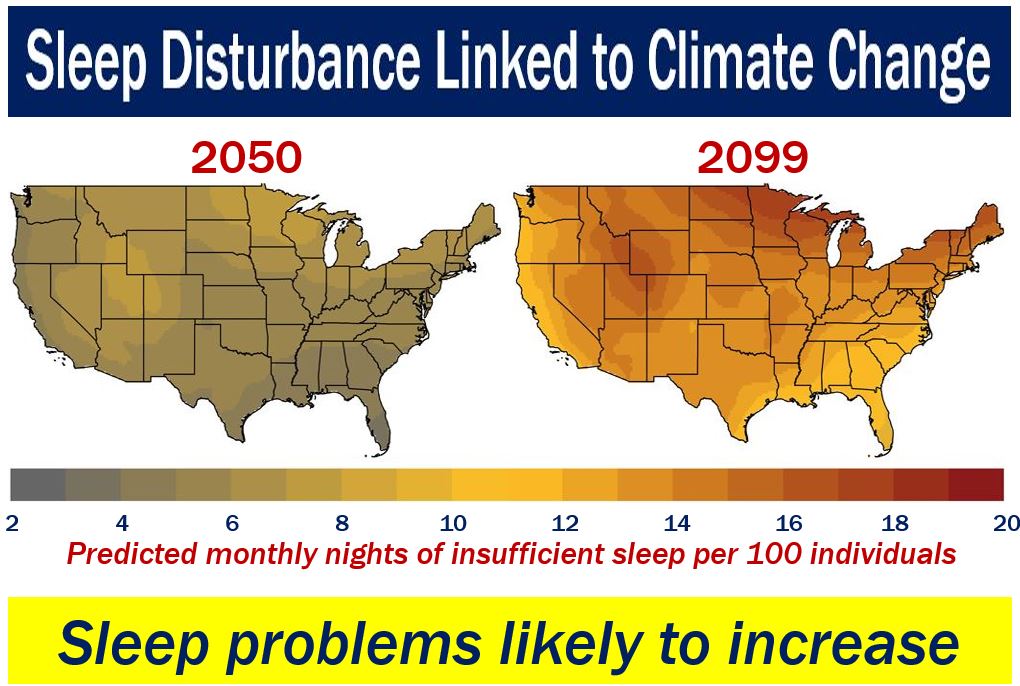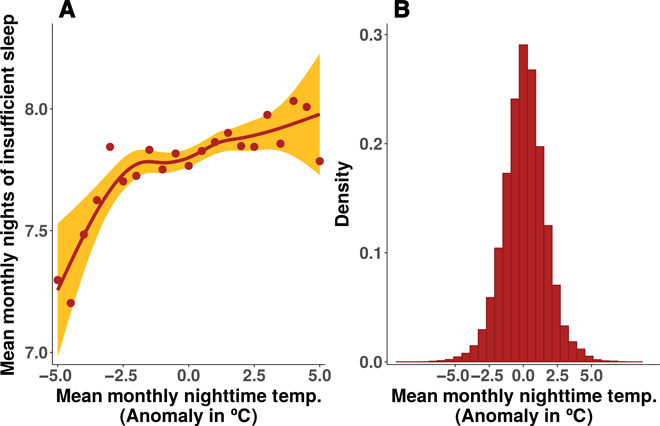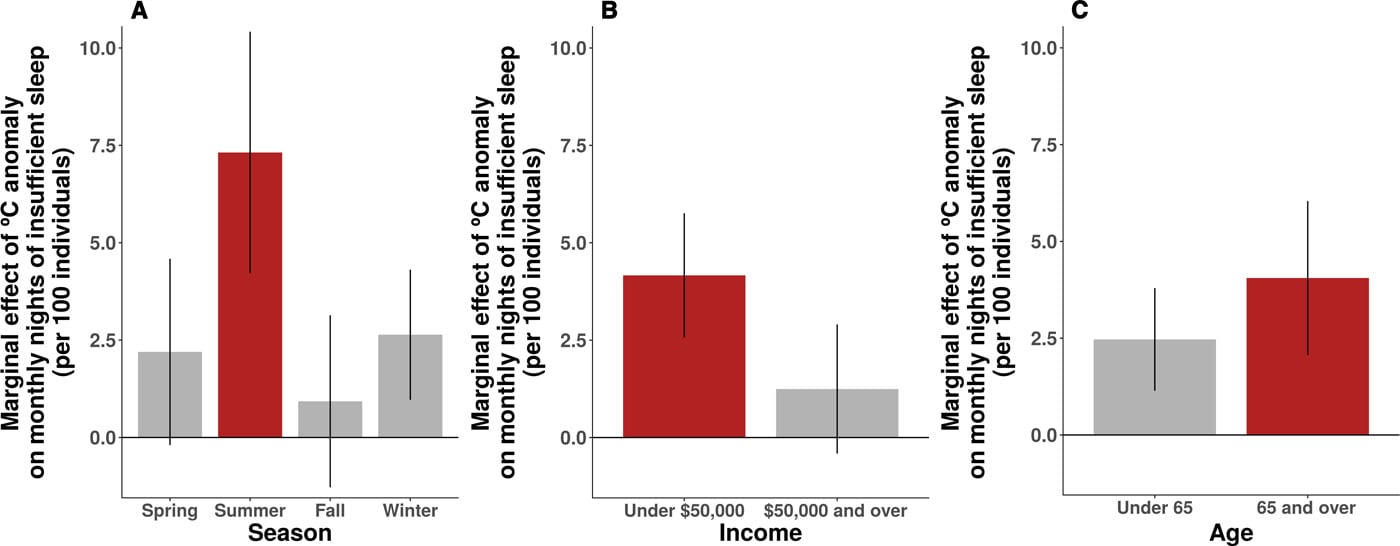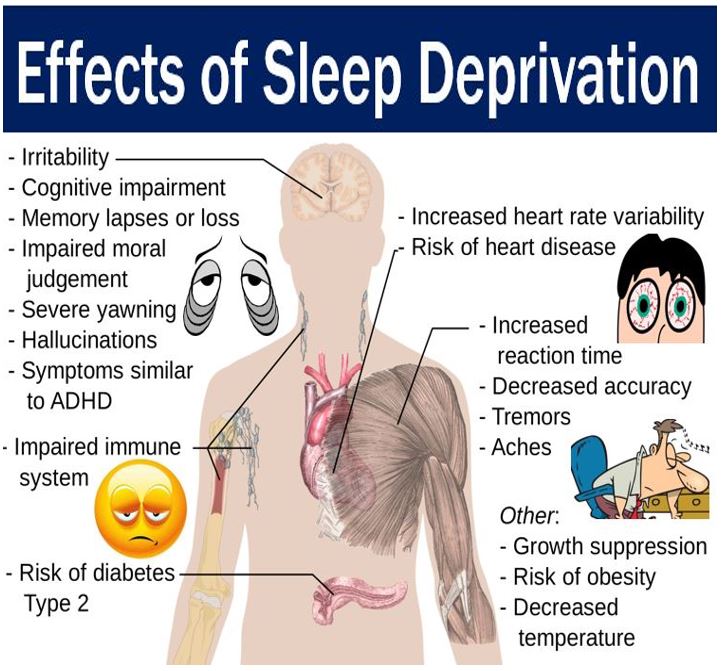Sleep deprivation is closely linked to climate change – warmer-than-normal nights undermine our sleep quality as well as duration, particularly during the summer months and among lower-income and elderly people, say researchers from Harvard University, the Massachusetts Institute of Technology (MIT), Massachusetts General Hospital, the University of California San Diego, and the University of California Riverside.
The scientists published details on their study and findings in the journal Science Advances, in an article titled – ‘Nighttime temperature and human sleep loss in a changing climate’.
The study of sleeping patterns and night-time temperatures across several US states is one of the first investigations to provide clear evidence that warmer temperatures, which are driven by climate change, may affect our sleep.
 Nighttime temperatures are forecast to rise most drastically in the Western and Northern United States. Dr. Obradovich cautioned that future forecasts of insufficient sleep are not certainties – just estimates. (Image: Adapted from advances.sciencemag.org)
Nighttime temperatures are forecast to rise most drastically in the Western and Northern United States. Dr. Obradovich cautioned that future forecasts of insufficient sleep are not certainties – just estimates. (Image: Adapted from advances.sciencemag.org)
Hot October sparked sleep disturbance curiosity
Two years ago during an exceptionally-warm October, authors Robyn Migliorini, a Ph.D. candidate in San Diego State University and University of California’s clinical psychology doctoral program, and Nick Obradovich, a postdoctoral fellow at Harvard Kennedy School, came up with the idea for the study.
Dr. Obravodich said:
“Our friends and colleagues in grad school weren’t sleeping well at night – sheets off, tossing and turning in the heat – and as a result people were lethargic and somewhat grumpy.”
“I wondered if anyone had linked what sleep researchers know from lab studies of temperature and sleep quality to observations outside of the lab, and ultimately to climate change.”
The researchers started by gathering and examining data from a set of CDC (Centers for Disease Control) surveys about health-related risk behaviors, which including sleep patterns.
Coincidentally, Ms. Migliorini was selected at random to be interviewed for the next annual CDC survey while in the middle of this study.
Ms. Migliorini said that as a participant, she gained valuable insight into what the survey experience was like.
 (A) Relationship between average monthly nighttime temperature abnormalities and respondents’ reported number of monthly nights with lack of sleep. As temperatures rise abnormally higher, insufficient sleep nights occur more frequently. (B) Distribution of average monthly nighttime temperature anomalies (2002–2011) from the daily nighttime temperature normals of 1981–2010. (Image: advances.sciencemag.org)
(A) Relationship between average monthly nighttime temperature abnormalities and respondents’ reported number of monthly nights with lack of sleep. As temperatures rise abnormally higher, insufficient sleep nights occur more frequently. (B) Distribution of average monthly nighttime temperature anomalies (2002–2011) from the daily nighttime temperature normals of 1981–2010. (Image: advances.sciencemag.org)
Migliorini, Obradovich and colleagues studied these CDC reports of lack of sleep from 765,000 people across the United States, as well as city-level nighttime temperature data between 2002 and 2011.
Summer months definitely the worst
During the summer months there were twice as many reports (per month) of disturbed sleep compared to the rest of the year, the authors wrote.
They also found that people on incomes below $50,000 per year reported almost three times the amount of lack of sleep when nighttime temperatures were at least 1.8° Fahrenheit above normal.
A greater number of people on lower incomes have no air conditioning (A/C) at night, either because they are keeping the machines switched off to save money, or because there is no A/C in their homes.
Dr. Obradovich said:
“And as we saw in San Diego, it’s the cheaper apartments that don’t have any air conditioning at all.”
Dr. Obradovich added that older people, who are not as good at regulating their body temperatures as younger individuals, were found to be twice as likely to report disturbed sleep during the warmer nights.
The team also studied how climate change may exacerbate the problem. Overall, they found that when nighttime temperatures were 1.8 °Fahrenheit higher than normal across the US for a whole month, nine million more nights of disturbed sleep were reported.
Ms. Migliorini said:
“I am most concerned by the fact that a substantial portion of American adults already report sleep difficulties and that increases in nighttime warming could further exacerbate the problem.”
 (A) The detrimental effects are twice as common in the summer months compared to other months of the year. (B) People earning <$50,000 annually have significantly higher responses to nighttime temperature anomalies. (C) Older individuals are clearly more severely affected than their younger counterparts. (Image: advances.sciencemag.org)
(A) The detrimental effects are twice as common in the summer months compared to other months of the year. (B) People earning <$50,000 annually have significantly higher responses to nighttime temperature anomalies. (C) Older individuals are clearly more severely affected than their younger counterparts. (Image: advances.sciencemag.org)
Lack of sleep and human health
Ms. Migliorini explained to Megan Jula, from the American Association for the Advancement of Science (AAAS), that lack of sleep has been found to make humans more vulnerable to psychological and cognitive deficiencies. It also undermines our immune systems.
Ms. Migliorini said:
“As insufficient sleep becomes more frequent, the risk of potential health impacts rises.”
Dr. Obradovich added:
“One thing that is pretty clear, though, is that human sleep is affected by nighttime temperatures. In order to sleep well during the summer when temperatures are warmer than normal, we may need to adapt by using more air conditioning, added fans at night and other technologies to counteract altered future temperatures.”
 Sleep deprivation can cause several physical and mental health problems. (Image: adapted from Wikipedia)
Sleep deprivation can cause several physical and mental health problems. (Image: adapted from Wikipedia)
The United States is a wealthy country with a temperate climate. It is likely that people who live in other hotter, poorer nations experience even more sleep loss, Dr. Obradovich believes.
In an Abstract in the journal that precedes the main article, the authors wrote:
“We observe the largest effects during the summer and among both lower-income and elderly respondents. We combine our historical estimates with climate model projections and detail the potential sleep impacts of future climatic changes.
“Our study represents the largest ever investigation of the relationship between sleep and ambient temperature and provides the first evidence that climate change may disrupt human sleep.”
Video – sleep problems and climate change
This video talks about the latest study published in Science Advances and the researchers’ findings. We all know about how climate change will affect our coastlines, extreme weather events, and our food supply. We can now add another problem to the list – sleeping less.
